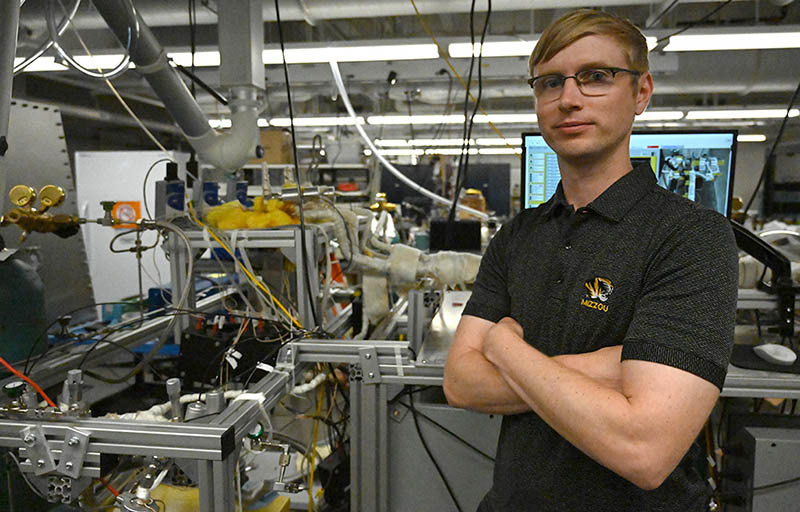June 12, 2023

Matthias Young remembers how quickly cell phone batteries would drain when he was in college.
“Your phone would not stay charged for the whole day, and this posed problems, especially when you were traveling,” he said.
Also at that time, hybrid electric vehicles were just beginning to come on the market and batteries were not advanced enough for all-electric vehicles.
Things have improved over the past 15 years, but there are still significant gaps between reality and theoretical possibilities.
Young — an assistant professor of chemical and biomedical engineering with a joint appointment in chemistry — is working to close those gaps. And that work is getting noticed.
Young recently received a prestigious National Science Foundation CAREER Award, which will provide five years of support for core research around polymer science.
And he is the 2023 recipient of the American Vacuum Society Prairie Chapter Award for Early-Career Research.
“It is a tremendous honor to receive these awards,” he said. “It recognizes that what we’re working on is valued by the broader scientific community.”
–
Growing up in the Kansas City area, Young was good at chemistry, enjoyed tinkering with electronics and had a creative streak. Ideas like equipping a home with automated blinds and other smart devices, figments of the imagination at the time, intrigued him.
After attending Missouri Scholars Academy at Mizzou in high school, Young fell in love with the Mizzou campus and came to the University of Missouri for his undergraduate studies, choosing chemical engineering as a major to combine his interests.
“I wanted to create new technology that would change the world, and chemical engineering gave me the skill set to do that” said Young.
It was during his undergraduate years that he first started doing research on battery technology. After graduation, he opted to attend graduate school at the University of Colorado at Boulder rather than accepting a job offer. He viewed graduate school as an opportunity to understand the fundamental physics underpinning battery technology and potentially make transformative discoveries.
“Graduate school opened my eyes to the enormous challenges and opportunities for fundamental research in electrochemistry” said Young.
Following graduate school, Young had postdoc positions at the National Institute of Standards and Technology in Boulder, Colorado, and Argonne National Lab outside Chicago. With his wife expecting their second child during his second postdoc position, Young knew it was time to return to the Show Me State.
“I saw coming back to Mizzou as a way to give back to the University that gave me so much,” Young said. “This is my home. And Mizzou has given me the resources and support to pursue impactful research that will help humanity.”
–
In the Mizzou Thin Film Coatings and Materials Electrochemistry Lab, Young and his team are working to make polymers by controlling the sequence of monomers molecule-by-molecule.
These polymers can conduct electricity, charging and discharging to make metal-free batteries using sustainable materials — fundamental elements such as nitrogen, sulfur and carbon found in nature.
Young envisions these batteries charging faster and lasting longer; ideally, he’d like to see an electric vehicle battery charge in minutes and last twice as long as those on the market today.
Additionally, he’s using fundamental principles of his research to study ways to make water desalination more energy efficient. Specifically, Young is looking at a process known as capacitive deionization, or CDI, to extract salt out of water.
And Young is applying his research to low-cost sensors that can detect nitrogen and phosphorous released into waterways from fertilizer.
While his work is specific to batteries, desalination and sensors, the fundamental findings from his research will have broader impacts in the future.
“Looking back through history, big advances in technology can be traced to the discovery of new materials,” Young said. “There are tremendous opportunities to advance our understanding of these conductive polymer materials and create new technologies to improve lives. We are specifically focused on energy and water treatment with these materials now, but I can envision ways these materials could help in medical applications and other technologies in the future.”
Conduct research alongside award-winning faculty to change the world. Apply today.